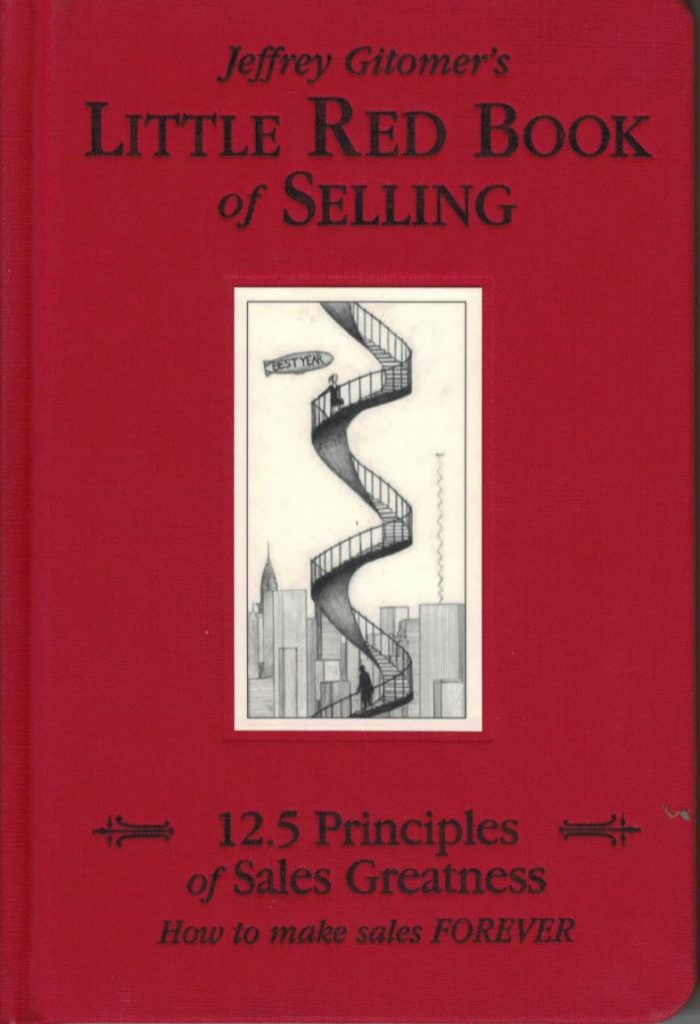 Jeffrey Gitomer’s Little Red Book of Selling: 12.5 Principles fo sales greatness: How to make sales FOREVER has way too many freaking subheadings to be taken seriously.
Jeffrey Gitomer’s Little Red Book of Selling: 12.5 Principles fo sales greatness: How to make sales FOREVER has way too many freaking subheadings to be taken seriously.
Just kidding, but there are a totally unreasonable number of books about sales. I’ve read more than a few of them. And frankly, they all kind of say the same thing. “Believe you can do it!”, “Selling starts at NO!”, “Don’t be afraid of failure!”, “Pick up the phone and call your prospect!” So on and so on ad nauseam. It gets very old.
However right about the process all these authors and sales trainers are, they always conveniently leave out any real discussion of good sales ethics. You know, where you’re not constantly trying to extract money out of the people who are stupid enough to trust you? The people who take books like this one and take them very seriously, you can pick them out of a networking event from across the room.
Anyway, I digress. Unfortunately, the Little Red Book of Selling doesn’t deviate from the trend. It’s mostly more of the same bits of information about garnering trust from a prospect, setting and meeting expectations, planning for sales calls, understanding value propositions, getting to the real decision maker, socratic selling, so on and so on.
The thing is, he’s not wrong. It’s just overly simplistic, especially from a philosophical standpoint. For example, in reality today, if someone sees you trying to sell without their permission, you lose. And if you can sell without them noticing that you’re selling, you’re manipulating them. There’s a lot of discussion about how to trick the human mind into cooperation, but very little about the ethics of doing so. And the fact that this is the trend throughout all of the books that I have read of this kind leads me to believe it’s why our culture has grown to hate sales people so much. It’s an irresponsibly managed skill set.
In one of the introductions, titled “what’s your biggest fear”, Gitomer boils every sales persons greatest fear into “the fear of failure”. But that is like trying to change a diaper with a baseball bat. A much more nuanced exploration of underperforming sales reveals dozens of specific reasons sales people struggle. My perpetual hangup is not found anywhere in Gitomer’s text. It’s known as ‘role rejection’. I reject the model of the salesperson that has been provided to me, and is perpetuated by books such as these, and so I reject that role. I can’t make myself follow Gitomer’s advice without sensing a betrayal of my personal values.
So, I was disappointed with this book. But, it wasn’t a waste of time and it did have some virtues. The most important benefit this book brought was that it was short. The concepts sales trainers like to go on and on about–and again, may well be right about within a good ethical framework–just aren’t that complicated. Gitomer distilled the information into a very easy to read and digest format.
Of course, praise ultimately withheld, because until I find a worldview that satisfies my principles and values about humanity and mutual respect, none of the insight is particularly useful. So rest assured, when I make a joke, it’s not to trick you into giving me your money. Not yet anyway.
If you already have a positive perspective on sales, I’d love to hear about it! But also, you may find value in Gitomer’s book here.

Recent Discussion